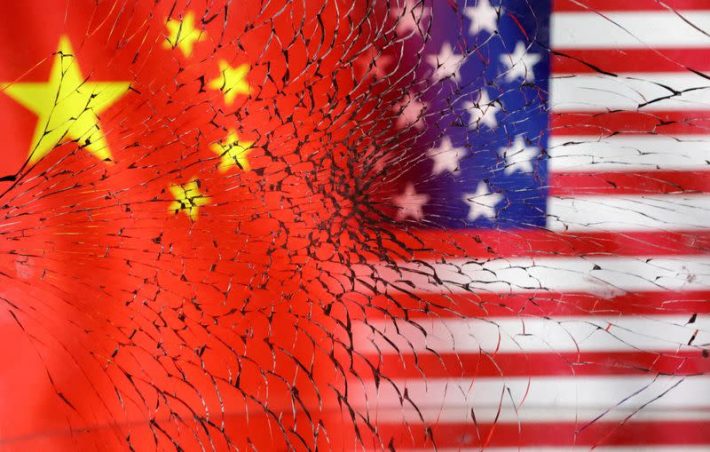China vowed to retaliate on Friday after US President Donald Trump’s latest threat to impose an extra 10% tariff on Chinese imports.
Beijing claimed the US was “shifting the blame” for the flow of fentanyl into the country and promised to hit back and protect its interests.
China’s Commerce Ministry said it had some of the world’s strictest anti-drug policies and highlighted the risks new tariffs would bring to global supply chains.
ALSO SEE: Trump’s Steel Tariff to Hit Chinese Supply Lines via Other Nations
Trump said on Thursday that 25% tariffs he has proposed on Mexican and Canadian goods will take effect on Tuesday, along with an extra 10% duty on Chinese imports.
Markets slump across Asia
The rise in US-China trade tensions hit stock markets across Asia on Friday, with the Hang Seng Index down 3.3%, the Shanghai Composite falling just under 2%, the Nikkei down 2.9% and the Sensex in India dropping 1.9%.
There was also speculation that Beijing is set to order steel plant closures next week because of increasing tariffs by the US and many other countries.
Meanwhile, Trump’s fresh tariffs on Chinese imports – in addition to the 10% tariff levied on February 4 – coincide with the start of China’s annual parliamentary meetings on Wednesday, a set-piece political event where Beijing is expected to unveil its main economic priorities for 2025.
The announcement also leaves Beijing less than a week to publish countermeasures, as the Trump administration shows signs of a hardening stance towards its strategic rival despite backing down on the threat of tariffs of up to 60% when Trump took office.
“China has repeatedly stated that unilateral tariffs violate World Trade Organization rules and undermine the multilateral trading system,” a Commerce Ministry spokesperson said in a statement.
“China has one of the strictest and most thoroughly enforced anti-drug policies in the world,” it said. “[The US] once again is threatening additional tariffs. Such behaviour is purely ‘shifting blame and shirking responsibility,’ which is not conducive to solving its own problems.”
Signs of wider decoupling
Analysts say Beijing still hopes to strike a deal with the Trump administration, but with trade talks not materialising yet and the White House ramping up signs it is preparing for a wider economic decoupling from China, the prospect of a rapprochement between the world’s top two economies was fading.
“There’s been a lot of motion, but it’s still not clear exactly what the Trump administration’s fundamental goal is with respect to China,” Christopher Beddor, deputy China research director at Gavekal Dragonomics, said.
The Commerce Ministry said it hoped to return to negotiations with the US as soon as possible, warning that failure to do so could trigger retaliation.
“If the US insists on proceeding with this course of action, China will take all necessary countermeasures to safeguard its legitimate rights and interests.”
Trump told reporters in the Oval Office on Thursday he decided to add the extra tariffs on China and stick to the Tuesday deadline for Canada and Mexico given what his administration sees as insufficient progress on curbing fentanyl flows into the country.
“There are ongoing discussions with the Chinese, Mexico and Canada,” a White House official was quoting as telling Reuters. “We’ve gotten a good handle on the migration issue, but there are still concerns on the other issue of fentanyl deaths.”
China’s Public Security Ministry said on Friday it had added seven new precursor chemicals to a domestic control list and 24 new precursor chemicals to an export control list. It said that it had cracked 151 cases of drug-making materials and seized 1,427.4 tons of drug-making materials in the past year, without specifying whether these were related to fentanyl.
Politburo keen to ‘resolve’ trade tensions
Both the White House and officials in Beijing’s Zhongnanhai appear to preparing for another four years of bruising trade tensions, despite Trump having also made comments on how well he gets on with Chinese President Xi Jinping.
Top Chinese Communist Party officials met on Friday and vowed to take steps to “prevent ” and “resolve” any external shocks to China’s economy during a discussion on the government’s annual work report due to be published at next week’s annual sitting of parliament, according to state media.
The Politburo meeting comes a week after the White House released an America First investment memorandum which squarely placed China in a list of “foreign adversaries” and accused Beijing of seeking to exploit investments in US firms to steal cutting-edge technology and fund its military development.
Earlier this month, Trump nominated China hawk Landon Heid for a key post at the Commerce Department overseeing the design of AI chip export controls targeting China and other countries.
- Reuters with additional input and editing by Jim Pollard
NOTE: Two pars were added to this report on February 28, 2025 about the impact on Asian markets and speculation on steel plant closures in China.
ALSO SEE:
US Chip Policy Upheaval Has Asian Chip Giants on Tenterhooks
Chinese Ships May Face a Hefty Fee to Enter US Ports
China, Asian Markets Fall After Trump’s Latest China Curbs
Investors Pour Money Into China Tech Stocks Amid DeepSeek Fever
China Tightens Focus on Tech Innovation, ‘New Productive Forces’
China Needs Tech Self-Reliance to Avoid Being Strangled: Xi
Apple Taps Alibaba to Bring AI to Chinese iPhones
US Postal Service Suspends Receipt of Parcels From China, HK
US Rules to Limit Investment in China’s Chips, Quantum and AI
US Ban on Investment Not Good For AI Sector, China Says
























